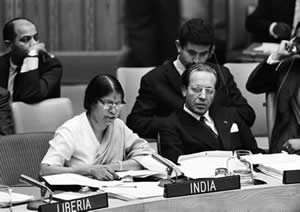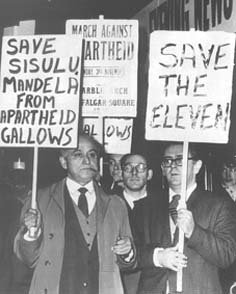Behind the Scenes:
International Pressure on South Africa to Not Execute Nelson Mandela
and Other Rivonia Defendants

U.N. delegates debate resolution calling
for abandonment of Rivonia trial
It is widely
assumed that international pressure influenced the decision not to
sentence Mandela and other convicted Rivonia defendants to death.
This page highlights some of
the
evidence for that assumption.
1. October 11, 1963: The United Nations General Assembly voted 106 to 1
(with only South Africa dissenting) to condemn apartheid repression and
call upon South Africa "to abandon the arbitrary trial now in progress
and forthwith to grant unconditional release to all political prisoners
and to all persons imprisoned, interned or subjected to other
restrictions for having opposed apartheid."
U. N
Resolution 1881 (Oct. 11, 1963) (pdf document)
2. June 9, 1964 (two days before the Rivonia trial verdict), the
U. N. Security Council adopted Resolution 190 on a vote of 7 to 0 (with
four abstentions, including Great Britain, the United States, France,
and Brazil). The resolution urged South Africa to end the trial
and grant amnesty to
all defendants.
U.N.
Security Council Resolution 190 (June 9, 1964)(pdf document)
3. U. N. representatives of 56 nations issued an appeal to all
countries maintaining diplomatic relations with South Africa "to take
all necessary measures to prevent the execution of African nationalist
leaders now on trial in Pretoria."
4. Two nations with significant influence, the United States and Great
Britain, made efforts to convince South Africa to not execute the
Rivonia defendants. The exact nature of these steps is not
known. Adlai Stevenson, the U.N. representative of the United
States, promised in a letter that the U.S. would do everything within
its power to prevent death sentences. Contacts with officials of
the South African government convinced the British foreign service
office in Capetown as early as May that death sentences were
unlikely. A May report from Capetown to London indicated that the
head of the South African Security Police did not expect executions and
that prosecutor Percy Yutar would not ask for death sentences in his
closing statement at the trial. (Yutar, in fact, did not request
imposition of the death penalty.)
5. On the night before the verdict, British Consul General Leslie
Minford assured defense attorney George Bizos that none of the accused
would be
sentenced to death. When Bizos asked Minford how he knew,
he said the judge told him so.

London protesters
|